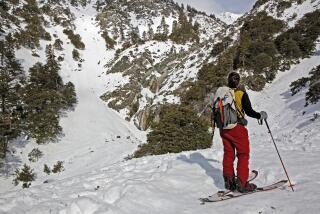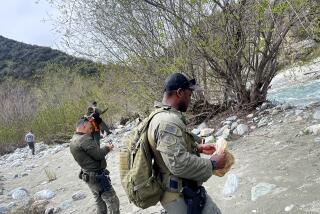Paying a stiff tab to rescue lost hikers
A decent whistle costs about a buck and weighs practically nothing. Had one been carried by the two young adults who spent four days lost in the Trabuco Canyon area, it could have saved thousands of dollars in search and rescue costs; it might have saved the pair from trips to the hospitals. It might have even prevented one rescuer from being injured in a fall.
Reading the comment boards on the stories about the college students who got lost in Holy Jim Canyon, a side canyon to Trabuco, on Easter Day — aside from the judgmental buffoons who have decided that the young man is an obviously shifty sort because he wears earrings and is thus inadequate to the task of hiking — I see a lot of knowledgeable head-shaking among hikers, lists of the items no hiker should be without. A map, plenty of water, extra food, a compass (it’s amazing how the lack of clear landmarks can lead a person in circles), a small emergency pack, a small flashlight, a fully charged cellphone.
There’s a lot of good advice, the sort that is generally followed by people who have one thing in common: They know what they don’t know. They bother to prepare. That’s especially necessary if, as it’s reported this pair did, you go off trail. I hike in that area frequently, and it’s not a particularly easy place to get lost, at least for those who stick to the trail. Head up, and you’re going toward the big dirt road that leads to the tallest point in Orange County. Head down and get to the creek and a wide dirt road, pretty well-traveled, that leads to civilization. A lot of people are scratching their heads about how these young people could have gotten quite this disoriented.
But I do think that it’s time to consider charging people for some of the costs attached to massive search-and-rescue operations, especially when the lost people have taken few if any of the most basic safety steps. Many cities charge people when police are called out for noisy parties; most people are charged for an ambulance ride; now a few municipalities are charging out-of-town accident victims who need the Jaws of Life to be rescued from their cars—even if the accident wasn’t their fault.
I lead a couple of hikes a month as a volunteer, and though most people come prepared—they’re supplied in advance with a list of must-haves—there are always a couple of people who arrive swearing they’re fine without water, they’re fine hiking in 90-degree weather with a layered, black, tight-fitting workout costume. In the past, when they started turning pale and dizzy from incipient heat exhaustion, as they almost always did, I gave them my water and cooling packs. Now I just tell them at the start that they can’t come; I’m hoping they’ll consider the fact that the wilderness should be approached with a little respect. Also sent away are the people who think ballet flats and flip-flops are appropriate attire for rocky hills; in the Trabuco Canyon case, Nicholas Cendoya reportedly wasn’t wearing shoes at all.
There are far worse examples than these two; in 2010, the New York Times detailed outrageous cases of visitors to national parks calling in rangers and rescue crews for issues as minor as the hikers’ water tasting salty. In one of the parks where I volunteer, rangers load up their pickup trucks with water on hot days and drive the accessible trails to hand out bottles to under-equipped hikers.
We don’t know all the facts about how careful the Orange County pair might or might not have been. What we do know is that the backcountry isn’t a free version of Disneyland. Hunger and thirst won’t be taken care of by someone peddling churros and lemonade around the bend; the rattlesnakes aren’t harmless animatronics. In a growing number of regions—a couple of counties in Utah, for example—there’s a fee of several hundred dollars for search and rescue -- not nearly enough to cover the costs, but a help--and a safety incentive. It might be time for California and its municipalities to consider doing the same—so that we can continue to have the resources to rescue people. Because mainly, for now, we’re just glad these young adults were found alive.
ALSO:
Blowing smoke on workplace health
Atlanta test scores: Cheating is cheating
More to Read
A cure for the common opinion
Get thought-provoking perspectives with our weekly newsletter.
You may occasionally receive promotional content from the Los Angeles Times.







